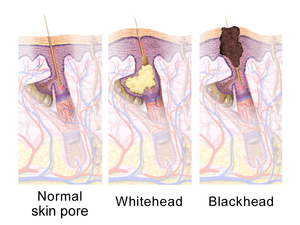Blackhead
| Blackhead | |
|---|---|
| Synonyms | plural comedones |
 |
|
| Illustration of blackhead | |
| Classification and external resources | |
| Specialty | Dermatology |
| ICD-9-CM | 706.1 |
A comedo is a clogged hair follicle (pore) in the skin.Keratin (skin debris) combines with oil to block the follicle. A comedo can be open (blackhead) or closed by skin (whitehead), and occur with or without acne. The word comedo comes from the Latin comedere, meaning "to eat up", and was historically used to describe parasitic worms; in modern medical terminology, it is used to suggest the worm-like appearance of the expressed material.
The chronic inflammatory condition that usually includes both comedones and inflamed papules and pustules (pimples) is called acne. Infection causes inflammation and the development of pus. Whether or not a skin condition classifies as acne depends on the amount of comedones and infection. Comedones should not be confused with sebaceous filaments.
Comedo-type ductal carcinoma in situ (DCIS) is not related to the skin conditions discussed here. DCIS is a non-invasive form of breast cancer, but comedo-type DCIS may be more aggressive and so may be more likely to become invasive.
Oil production in the sebaceous glands increases during puberty, causing comedones and acne to be common in teenagers. Acne is also found pre-menstrually and in women with polycystic ovarian syndrome. Smoking may worsen acne.
Oxidation rather than poor hygiene or dirt causes blackheads to be black. Washing or scrubbing the skin too much could make it worse, by irritating the skin. Touching and picking at comedones might cause irritation and spread infection. It is not clear what effect shaving has on the development of comedones or acne.
Some, but not all, skin products might increase comedones by blocking pores, and greasy hair products (like pomades) can worsen acne. Skin products that claim to not clog pores may be labeled noncomedogenic or non-acnegenic. Make-up and skin products that are oil-free and water-based may be less likely to cause acne. It is not known whether dietary factors or sun exposure make comedones better, worse or have no effect.
...
Wikipedia
